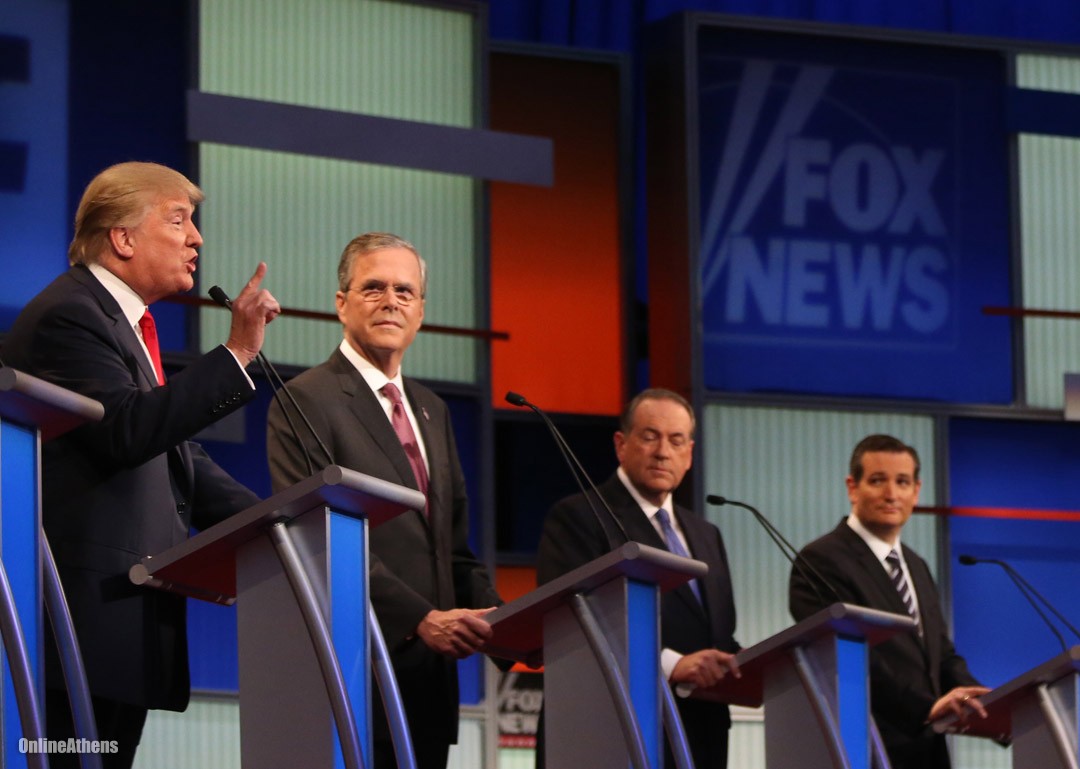Ever since John Kennedy and Richard Nixon squared off in 1960, televised presidential debates have become a fixture of American politics. Whether it’s Al Gore’s repeated sighing or George H.W. Bush looking at his watch, there are dozens of moments which the conventional wisdom cites as being influential in the campaign.
How much do debates actually move the numbers for the various candidates though?
In this particular cycle, good debate performances seem to have been good for former Hewlett-Packard CEO Carly Fiorina who rocketed up to 15 percent support following the second candidate forum which was hosted by CNN in September. Today, however, she is at 2 percent.
The evidence from elections past indicates that debates can have some effect but that usually it’s rather temporary as George Washington University political scientist John Sides has noted:
Al Gore’s performance in the first debate—with its interruptions of George W. Bush and audible sighs— was widely lampooned and is also considered by some to be one of the “biggest blunders” in the history of presidential debates. After the debate, there was a swing of 2 or 3 points toward Bush, enough to give him a narrow lead. Erikson and Wlezien estimate that after all of the debates, Gore’s poll standing was about 2 points lower than it was before. Among the many factors that influenced the outcome of the 2000 election, the debates appear to have been one.
But, even in 2000, this focus on presidential debates obscures an important point: debates aren’t the only thing that voters are hearing and seeing in the weeks before the election. So even a careful comparison of polls before and after a debate assumes, perhaps incorrectly, that any change was due to the debate itself or to news coverage about the debate—and not to other events, television advertising, or the like.
Moreover, other events may outweigh any debate effect. The 1980 election provides one example. After the debate and before the election, all of the following took place: prominent aides to both Reagan and Carter were forced to resign; economic data was released showing rising inflation; there was continued news coverage of the congressional investigation of Carter’s brother, Billy; and, finally, Carter was again rebuffed by Iran in his attempts to negotiate the release of the American hostages who had been held for a year. The Carter campaign’s internal polling showed Carter slipping even more after the setback in Iran than he appeared to be after the debate. ”It was all related to the hostages and events overseas,” said Carter’s pollster, Patrick Caddell. Reagan’s larger-than expected victory appeared to confirm that there was a late trend in his favor. Whether these events definitively hurt Carter in the closing days of the campaign is as difficult to determine as whether the debate helped Reagan. But the broader point remains: presidential campaigns present voters with a steady stream of information that may overshadow the debates.
But is it the debates themselves that matter or is it the coverage of debates after the fact that matters? That part seems much more clear as a study conducted by Arizona State University polisci prof Kim Fridkin who found that people who watched debates were deeply influenced by media discussions of the contests including their perception of who “won.”
In a paper published by the Journal of Politics which focused on a 2004 debate between George W. Bush and John Kerry, Fridkin and her collaborators found that people who watched TV news coverage from NBC which indicated that Bush had won the faceoff were much more likely to think that he bested Kerry. This graph from the study is illuminating:

Fridkin and her colleagues also found that the effect of news coverage about the debate had little effect on people who were politically well-informed but that it had a significant effect on those who did not know much about politics. The qualities that were particularly susceptible to media interpretation included whether a candidate was empathetic, hopeful, angry, and a strong leader.
Media coverage has also been found to impact how much actual policy viewers come away with from debates as well. In a 2012 study done by Ohio State communications professor Ray Pingree, people who consumed media coverage which framed debates in “win-loss” way were far less interested in substantive policy differences than those who were not subjected to such coverage.
Just something to keep in mind if you’re watching tonight’s GOP debate in Las Vegas and watching and reading the analysis after the fact.
Photo via screenshot.
